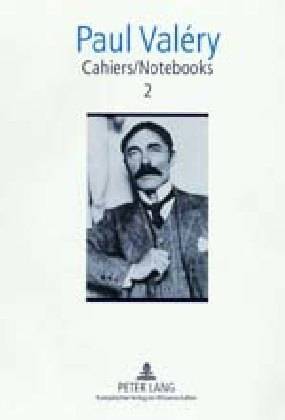
Door een staking bij bpost kan je online bestelling op dit moment iets langer onderweg zijn dan voorzien. Dringend iets nodig? Onze winkels ontvangen jou met open armen!
- Afhalen na 1 uur in een winkel met voorraad
- Gratis thuislevering in België vanaf € 30
- Ruim aanbod met 7 miljoen producten
Door een staking bij bpost kan je online bestelling op dit moment iets langer onderweg zijn dan voorzien. Dringend iets nodig? Onze winkels ontvangen jou met open armen!
- Afhalen na 1 uur in een winkel met voorraad
- Gratis thuislevering in België vanaf € 30
- Ruim aanbod met 7 miljoen producten
Zoeken
Cahiers / Notebooks 2
Editor in Chief: Brian Stimpson- Associate Editors: Paul Gifford and Robert Pickering- Translated by Rachel Killick, Robert Pickering, Norma Rinsler, Stephen Romer and Brian Stimpson
Paul Valéry
Hardcover | Engels
€ 118,95
+ 237 punten
Omschrijving
The Cahiers/Notebooks of Paul Valéry are a unique form of writing. They reveal Valéry as one of the most radical and creative minds of the twentieth century, encompassing a wide range of investigation into all spheres of human activity. His work explores the arts, the sciences, philosophy, history and politics, investigating linguistic, psychological and social issues, all linked to the central questions, relentlessly posed: 'what is the human mind and how does it work?', 'what is the potential of thought and what are its limits?'
But we encounter here too, Valéry the writer: exploratory, fragmentary texts undermine the boundaries between analysis and creativity, between theory and practice. Neither journal nor diary, eluding the traditional genres of writing, the Notebooks offer lyrical passages, writing of extreme beauty, prose poems of extraordinary descriptive power alongside theoretical considerations of poetics, ironic aphorisms and the most abstract kind of analysis. The concerns and the insights that occupied Valéry's inner voyages over more than 50 years remain as relevant as ever for the contemporary reader: for the Self that is his principal subject is at once singular and universal.
But we encounter here too, Valéry the writer: exploratory, fragmentary texts undermine the boundaries between analysis and creativity, between theory and practice. Neither journal nor diary, eluding the traditional genres of writing, the Notebooks offer lyrical passages, writing of extreme beauty, prose poems of extraordinary descriptive power alongside theoretical considerations of poetics, ironic aphorisms and the most abstract kind of analysis. The concerns and the insights that occupied Valéry's inner voyages over more than 50 years remain as relevant as ever for the contemporary reader: for the Self that is his principal subject is at once singular and universal.
Specificaties
Betrokkenen
- Auteur(s):
- Uitgeverij:
Inhoud
- Aantal bladzijden:
- 596
- Taal:
- Engels
Eigenschappen
- Productcode (EAN):
- 9783631367636
- Verschijningsdatum:
- 22/06/2001
- Uitvoering:
- Hardcover
- Formaat:
- Genaaid
- Afmetingen:
- 160 mm x 230 mm
- Gewicht:
- 929 g

Alleen bij Standaard Boekhandel
+ 237 punten op je klantenkaart van Standaard Boekhandel
Beoordelingen
We publiceren alleen reviews die voldoen aan de voorwaarden voor reviews. Bekijk onze voorwaarden voor reviews.











